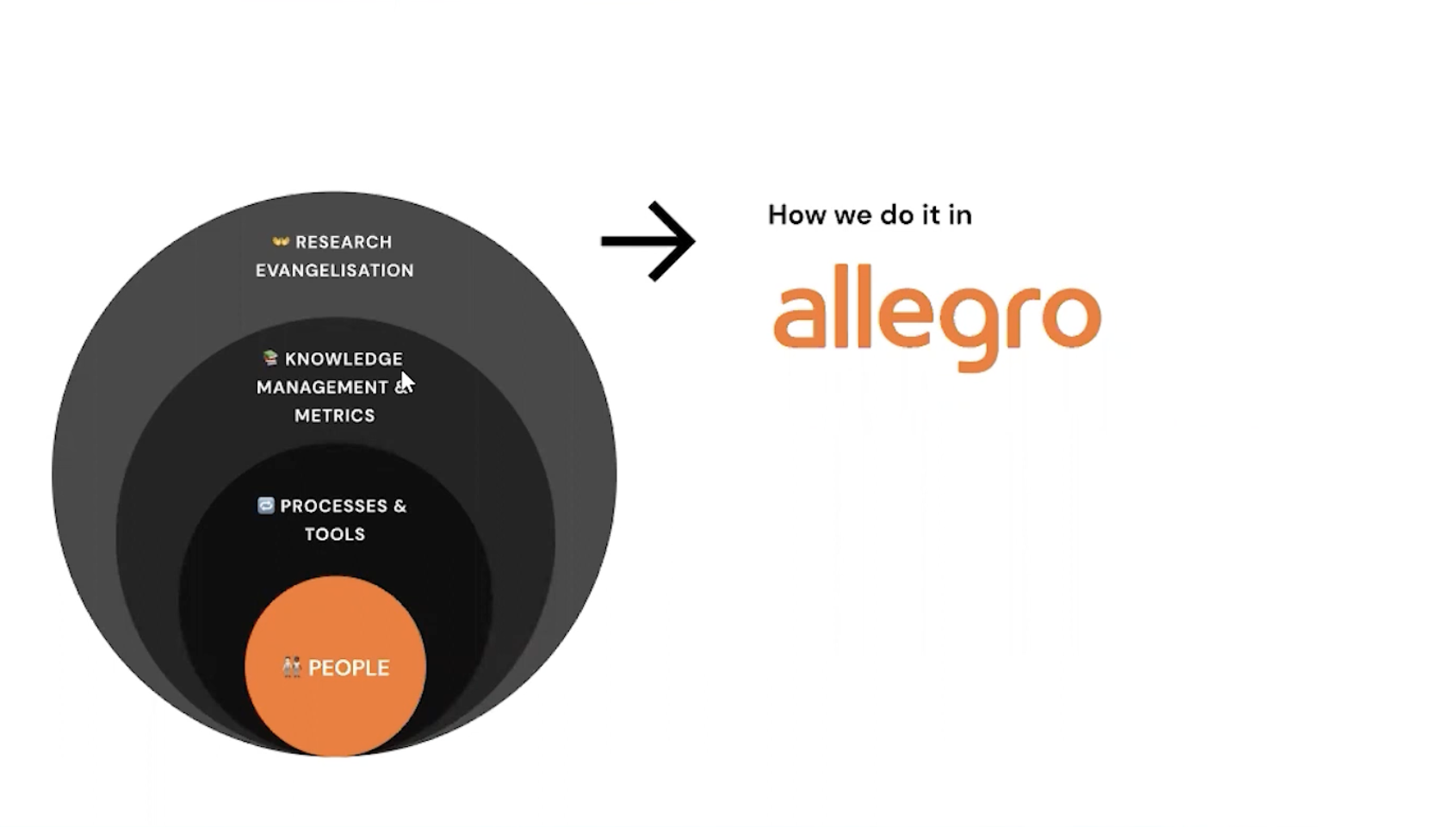Boosting UX Research Efficiency with ResearchOps: The Allegro Experience

Allegro, Europe's largest marketplace, serves 22 million users each month, offering 250 million items from over 130,000 sellers. These numbers reflect our strong focus on user experience (UX) and our commitment to customer support. Iterating on the constant feedback we receive has made us the top recognizable commercial internet brand in Poland.
The Evolution of Allegro's UX Team
We began with a small team of UX generalists and usability testers just 12 years ago. Today, we boast the largest UX research team in Poland, with over 130 design and research experts. Each quarter, our research team conducts at least 100 research projects to gather the data that drives our business, which emphasizes the crucial role of research in our design process. To manage the complexity of such a large team and high volume of projects Allegro implemented ResearchOps with the goal of supporting the UX research team to become more agile, flexible, and, most importantly, effective.
What is ResearchOps?
Kate Townsend, one of the creators of the ResearchOps community, defines ResearchOps as focusing on the people, mechanisms, and strategies that support the visibility of research across the design process. ResearchOps support research teams in effective research delivery, providing effective tools and processes, scaling research impact across organizations, and democratizing research knowledge.
Back in 2018, a group of UX researchers carried out a series of workshops to systemize the position of research in the design process, with the end result of a detailed map of when and where in the design process research could make the process more efficient.

The key components of the map focussed on:
- Budget management. Financial resource allocation and research budget optimizations.
- Tools. Finding the right tools to support researchers in the effective delivery of research. Tools are one of the most important ResearchOps assets in terms of optimization.
- Asset management. All of the tasks connected to the raw data storage including security and findability. This one is the fun part of the ResearchOps job.
- Internal communication. Research reporting, socializing, and evangelizing.
- Knowledge management. Making research findings visible across the organization.
- Guidelines and templates. Allowing researchers to focus on the content and not the structure of the research reports. And ensuring consistency across reports to make them easier to consume for the product team and all of its members.
- Capability & opportunity. The development of the research team members. Finding the right training and creating development opportunities for research team members.
- Team building / care. Onboarding new members of the team and celebrating small or big successes on the team and even celebrating birthdays.
- Event management. Organizing research team events and finding the space and right time for each member to have the ability to attend.
- Governance: Ensuring that every part of the research project is aligned with the law and internal regulations, as well as research ethics and privacy.
- Recruitment: Making the process simple and efficient. This includes ensuring that the right equipment exists, incentives for participants are organized, and the process and the conditions of the recruitment done by the researchers are as expected.
- Research Spaces: Creating a supportive environment for research. Even though most research is done online now due to COVID, the labs and meeting rooms are still a thing.
So as you see now, ResearchOps is a complex concept, but critical to enable the researchers to focus on what they have to do.
Implementing ResearchOps at Allegro
We decided to simplify the ResearchOps map and create our own approach to organizing ResearchOps. We specified four areas we'd like to focus on starting with our key value, the people because they are the center and the heartbeat of our organization. On top of the happy researchers, we put the tools and processes to allow us effectively do the research. After that, we focused on sharing the research deliverables. We wanted them to be visible and accessible across the organization. And last but not least, research evangelization. That's the key to demonstrating the value of the research and ensuring that insights are adopted across the organization.

People
We focus not only on the team composition and role definitions but also on building a strong brand of UX researchers across Allegro. The core of this area is to create a supportive environment for researchers, inspire them, give them space for self-development, and offer opportunities for growth.
Processes and tools
The UX research team is a part of the larger product team so we were conscious not to focus solely on the optimization of the research but also on the synchronization of the research with the wider team. We also provide tools that make the research process smoother.
Knowledge Management
Making research work visible across the organization is essential; it's not possible to build a great product without proper research. We make work visible across the organization through knowledge bases, insight repositories, and other resources.
Metrics
We use key performance indicators (KPIs) to help us focus on what is most important and to measure the efficiency of our research process.
The Benefits of ResearchOps
ResearchOps provides several key benefits:
It allows researchers to focus on their work, free from distractions.
It streamlines the design process by making research more accessible and optimized.
It engages others in research by providing guidance, tools, and education.
It measures success using KPIs like response rate, cost optimization, and employee retention rate.

Conclusion
In summary, ResearchOps play a critical role in supporting teams and making research more accessible, enjoyable, and efficient. By focusing on people, development, work environment, resources, and optimization, ResearchOps have allowed Allegro to enhance our user experience and streamline the design process. Embracing ResearchOps can be a rewarding and valuable endeavor for organizations aiming to deliver exceptional customer experiences.
Ania Kaliska
UX Research Ops Allegro
Ania is UX Research Ops at Allegro, the biggest CEE e-commerce platform. Focuses on scaling, democratisation & evangelisation of the design research in the biggest UX Team in Poland. One of her superpowers is being constantly curious about finding ways to make products and services better. As a Product Discovery advocate, she finds innovative ways to resolve customers' problems based on research and data-driven analysis. Previously she has been a marketer and project manager, for leading Allegro's content team and managing +35K inspirational content pieces. As a people enthusiast, Ania loves to share her experiences as a Mentor & Google Women Techmakers Ambassador.
Get latest articles straight to your inbox
A weekly list of the latest news across Product, UX, Design and Dev.

